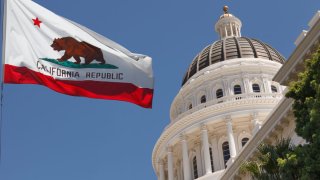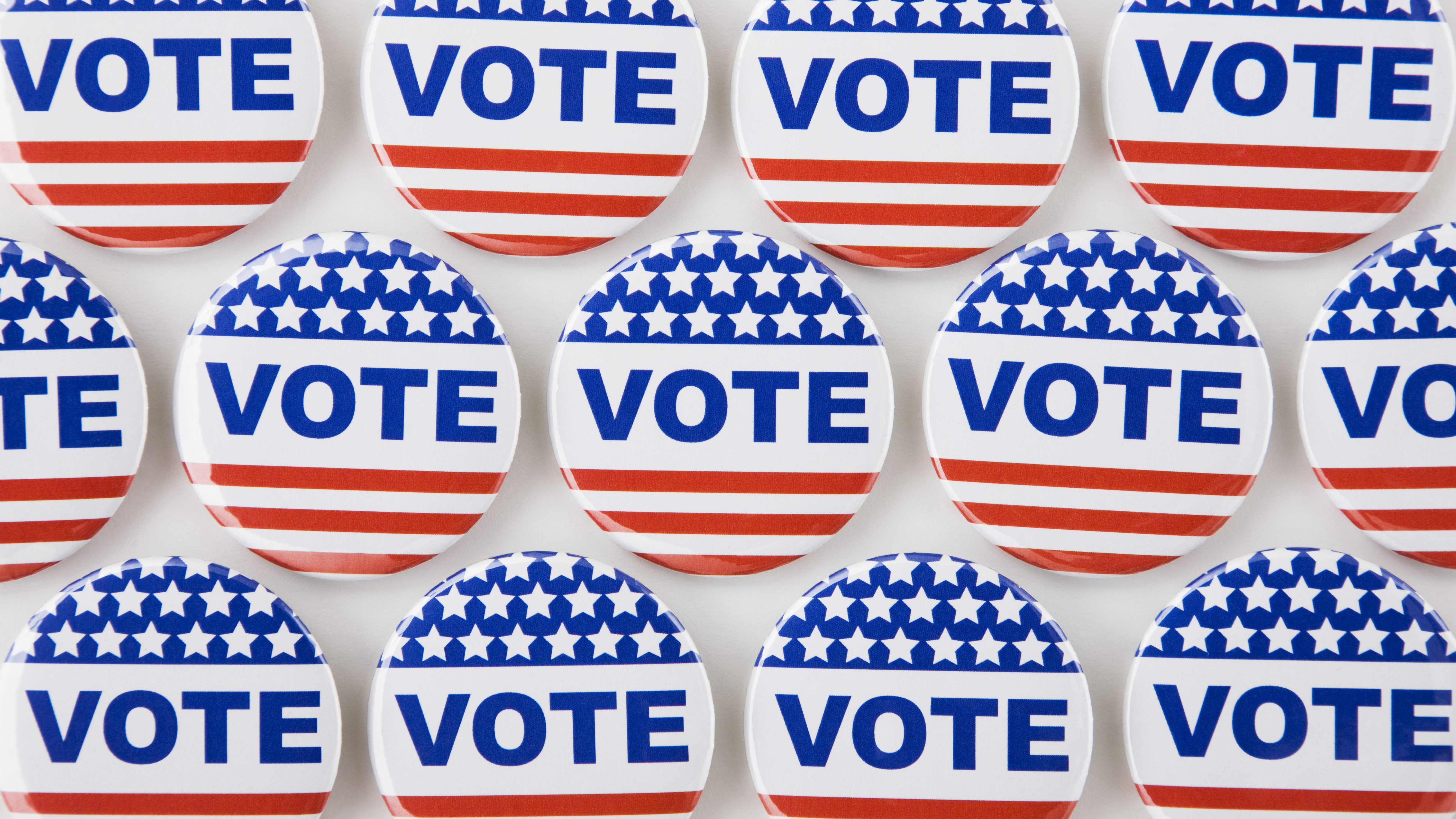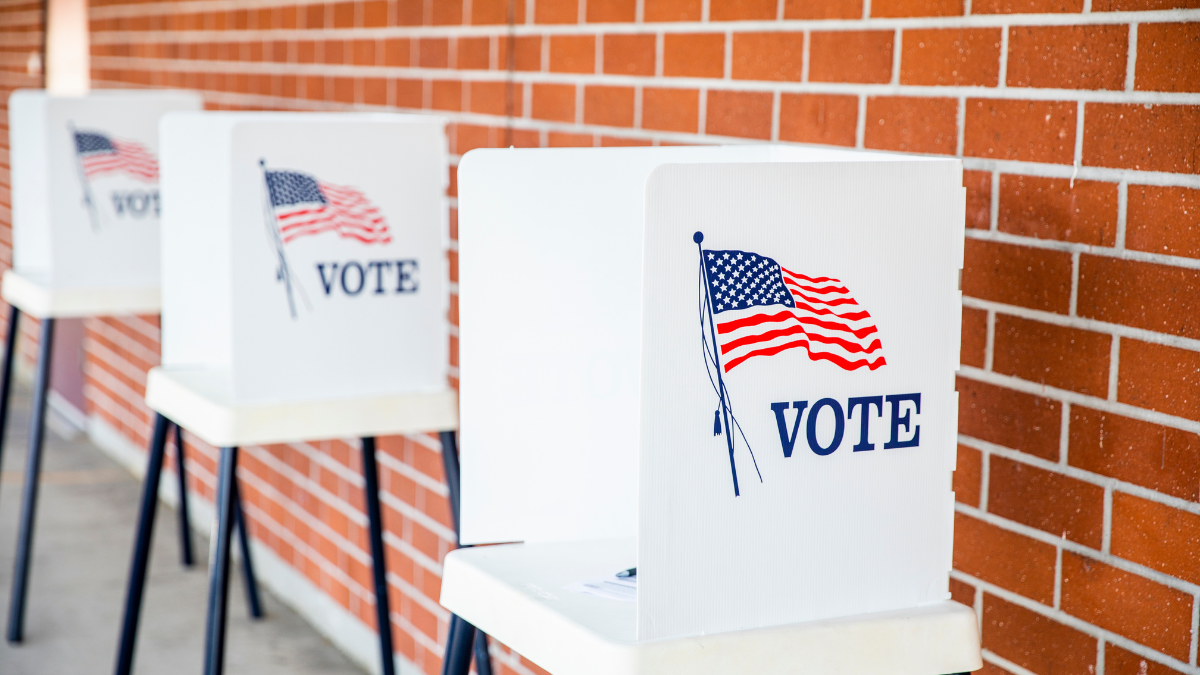
Decision 2024: What to Know
- San Diego Voter's Guide: Everything you need to know about voting in the 2024 Presidential Election
- When is the deadline to vote? Election Day is Nov. 5, 2024. For more important dates, click here.
- Where to vote early: Early voting is underway now through Election Day. Starting Nov. 2, more than 200 locations opened for in-person early voting. Find a location here.
- How to vote by mail: Every San Diego County voter receives a ballot in the mail. Fill it out, sign it, and return it at hundreds of drop-off locations across the county.
- Who is on the ballot? Enter your address here to find candidates on the state and national level. Follow NBC 7's Decision 2024 for more on local measures and candidates.
- What propositions are on the ballot? Here are all 10 California ballot propositions for the 2024 election, explained
- Report a problem: Here's how to report incidents at the polls
Besides the presidential, California Senate and local races, San Diego voters also have some important statewide ballot measures to consider before the Nov. 5 Presidential Election.
This year's ballot includes 10 statewide propositions that cover a variety of topics, including affordable housing, minimum wage and the right to marriage. Here's a breakdown of each of them:
Decision 2024:
Get top local stories in San Diego delivered to you every morning. Sign up for NBC San Diego's News Headlines newsletter.
Prop 2: Bonds for public school, community college facilities
Proposition 2 is a $10 billion bond measure to build schools, with most of that money going to kindergarten through 8th-grade schools in the state.
School districts like Alum Rock in Bay Area's San Jose said they desperately need the help — not to build new, state-of-the-art buildings, but to add maintenance to all the old classrooms they currently have.
"We’re not in a position to just build new schools. We’re a working class district," Alum Rock Union School District board member Andres Quintero said. "The assessed valuation from our properties limits what we can ask from the voters."
That's why Quintero is supporting Prop 2. It would raise $8.5 billion in bonds for schools statewide and another $1.5 billion for community colleges.
The measure is running into opposition from the Santa Clara County Libertarian Party and Mark Hinkle, president of the Silicon Valley Taxpayers Association.
"The concern we have from the Libertarian point of view is bond measures, like home mortgages, it can be very deceptive because they tell you it's $10 billion, but what is it really going to cost by the time you add in principle and interest for 30 or 40 years?" Hinkle said. "It’s probably going to be more like $18 to $20 billon."
Prop 3: Constitutional right to marriage
In 2013, a U.S. Supreme Court ruling nullified California’s controversial Proposition 8 — the voter approved state constitutional measure that officially defined marriage as between a man and a woman. But more than a decade later, the inert measure remains on the state’s constitution.
Now, activists hoping to nullify Prop 8 once and for all are going to the November ballot with Prop 3, another constitutional measure that would officially scrub Prop 8 from the state books and declare same-sex marriage a fundamental right.
The Supreme Court’s decision legalizing same-sex marriage across the nation seemed to quell the tumultuous ride of same-sex marriage in California, which began in 2004 when then-San Francisco Mayor Gavin Newsom instructed the city to begin issuing marriage licenses to same-sex couples, which were voided six months later by the California Supreme Court.
But Shay Franco-Clausen, political director with Equality California, worries a change in national leadership could open the door for opponents of same-sex marriage to pounce. That's why she is working to make sure Prop 3 passes.
“Seeing what happened with Roe v. Wade, we’re just preparing California to be a safe haven for those people that are married so we make sure it’s legal here in California," Franco-Clausen said.
A number of religious groups have spoken out in opposition to Prop 3, saying same-sex marriage goes against their beliefs. Jonathan Keller of the California Family Council said his concern revolved around Prop 3’s guarantee of a “fundamental right to marry,” which he believes is too ambiguous.
“Prop 3 removes any boundaries on marriage,” Keller said. “There is no definition under Prop 3 on the genetic relationship between people who could get married, the age of people who could get married, or the number of people who could get married.”
Franco-Clausen pointed out that in addition to the emotional aspect, marriage was also practical by entitling married couples to share insurance and to make medical or end-of-life decisions.
Prop 4: Bonds for safe drinking water, wildfire prevention
Proposition 4, The Safe Drinking Water, Wildfire Prevention, Drought Prevention and Clean Air Bond Act of 2024, would authorize a $10 billion bond with the money going toward a slew of climate and environmental programs addressing everything from sea level rise and sustainable farming to clean water. The bond would help offset recent state budget cuts that resulted in cuts to programs intended to address climate change-related issues.
The bond would dedicate money to a laundry list of climate change issues across the state – $1.4 billion for clean water and drought programs, $1.4 billion for wildfire and forest resilience programs, $300 million for climate resilient farms, $850 million for clean air programs, $700 million for parks and open space, and $1.2 billion for coastal resilience.
“It’s really important to make these investments now," said David Lewis, director of the environmental group Save the Bay in the Bay Area. "It actually saves us money in the long run. If we don’t prepare for the sea level rise that’s coming, it’ll cost us a lot more from the disasters it’s going to cause.”
If passed, the bond would allow the state to borrow $10 billion to pay for the projects. According to the state’s legislative analyst, the bond would cost the state $650 million in payments every year from the general fund to pay back the money over the 30-year life of the bond.
The Howard Jarvis Taxpayer’s Association opposes the bond, saying the state should finance the programs out of its general fund rather than borrow the money. Jon Caupal, president of the group, said another concern is the wide list of projects that would receive funding.
“The list of projects here is so broad based, everything from sea level to agriculture,” said Caupal. “It’s a laundry list, kind of a mish-mash of all these projects without any clarity about which ones are going to be financed, which ones have the priority.”
Prop 5: Local bonds for affordable housing, public infrastructure
A "yes" vote on Proposition 5 would make it easier for governments to borrow money. A "no" vote would maintain the status quo.
When local governments in California want to borrow money, in the form of bonds, they need to seek voter approval through a measure on the ballot. Typically, these proposals require a supermajority of 66%. Prop 5 asks voters to lower that threshold to 55%.
Prop 5 advocates say parks, police stations and affordable housing are among the projects cities would be able to fund with the money they could more easily borrow if the proposition passes.
“We've got to do more to raise the funds we need to build the housing and to fund the housing that people at that end of the income spectrum need to live in, and Prop 5 is a really critical tool to help us achieve that,” said Matthew Lewis of California YIMBY.
Opponents, however, argue a "yes" on Prop 5 will ultimately come at a cost for taxpayers. According to the nonpartisan state Legislative Analyst's Office, the local bonds would be repaid through higher property taxes.
“The bottom line is to protect their monthly checking account to keep as much money as they can keep and stop letting government take more of their money,” said State Senate Minority Leader Brian Jones of Santee.
If Prop 5 passes, it applies to bonds on the same ballot this fall.
Prop 6: Ending involuntary servitude for incarcerated persons
The California state constitution bans slavery, except as a punishment for a crime. Proposition 6 seeks to stop the practice of forced labor within state prisons.
Lawmakers in both chambers in Sacramento voted overwhelmingly to get the "End Slavery in California Act" on the ballot, led by District 11 Assemblymember Lori Wilson.
"Forced labor diminishes human dignity, and this is about restoring human dignity and ensuring that our incarcerated persons can choose a path of rehabilitation,” Wilson said.
Wilson said rehabilitative programming, like counseling or classes, can be forced to take a backseat when people are punished should they refuse to work.
Joel Abreu is serving a life sentence at Richard J. Donovan Correctional Facility. He said refusing to work could come at a high cost for people who are incarcerated. For example, a write-up, Abreu said, could make it more difficult to be released on parole. The jobs to which many incarcerated individuals are assigned, he added, do not have much value when people reenter society.
“They will be your neighbors. That's the way it is, and we need to focus on rehabilitation, mental health and education,” Abreu said.
Wilson said the ballot measure coming before voters in November should not have a high cost associated with it because the proposal does not require incarcerated workers to be paid minimum wage.
In a statement, a spokesperson for the California Department of Corrections and Rehabilitation said, "CDCR values the contributions of its incarcerated workers and is committed to its mission to prepare people in its custody for a successful return to their communities. We are still working on our fiscal analysis of the measure. We will be following the results of this issue after the November election."
Prop 32: Raising minimum wage
California's current $16 minimum wage is more than twice the federal minimum wage, which is $7.25. Even so, minimum wage workers in California come up about $20,000 short of the annual average cost of living in the Golden State.
“I live with my brothers because I don't think I can afford to rent my own apartment because the cost of living is very, very expensive," Renato Palisoc said.
Palisoc has worked at the Hilton Bayfront in San Diego for 16 years. He said wages have gone up incrementally during that time, but the cost of living in California has increased exponentially. That's why he's pushing for Proposition 32 to pass in November.
While the wage hike would be dollars in the right direction, he said, it is still not enough to offset the rising cost of living. Should voters approve Prop 32, it would be the first statewide wage hike in nearly a decade.
However, those are the kind of inflation concerns that make John Kabateck wary of Prop 32. He is California's state representative in the National Federation of Independent Business, which opposes the measure.
“Let's give small business owners a chance to crawl out of that hole. But taking minimum wage up to $18 an hour, it's making it more difficult for other small businesses to compete,” said Kabateck.
Although small businesses are struggling to staff up, Kabateck said there is a steep cost to blanket higher wages.
“The very people who are feeling the biggest fallout of this are these young workers who are trying to find jobs, not just summer jobs, long term jobs, but that's not going to happen when we're seeing businesses shut down,” Kabateck said.
Prop 33: Expanding rent control
There is discord among housing advocacy and tenant rights groups on the matter of Proposition 33, a measure that would give city governments expanded power to control rent costs.
For nearly three decades, California has had the "Costa-Hawkins" law in place. That restricts a city's capacity in terms of implementing rent control policies. Cities cannot impose rent control on single-family homes or apartments built after 1995. When a new tenant moves in, landlords can set their own rental rates.
Prop 33 aims to change that and give cities the power to set rent control for any kind of housing. Similar measures were rejected by voters in 2018 and 2020.
San Diego Mayor Todd Gloria joined a growing chorus of mayors from across the county — and across the aisle — who oppose the measure. California YIMBY is also against the proposition. Opponents have raised nearly $70 million and say rent control restrictions will drive developers away and ultimately worsen the housing shortage.
"In San Diego, our housing policies are beginning to yield results, increasing housing supply, and we're starting to see nominal decreases in rents. This measure would undermine our efforts, stall home building and reverse the progress we've worked so hard to achieve," Gloria said in a statement to NBC 7.
Supporters of the measure, who have raised about $20 million, say something has to change in a state where, according to the Public Policy Institute of California, some 30% of renters spend more than half their income on rent. They say local governments should have the agency to specify housing policy based on local needs.
The California Democratic Party and the organizations Tenants Together and Housing is a Human Right are among the supporters.
Prop 34: Restricting spending of prescription drug revenues
A federal law dating back 30 years gives health care providers who serve low-income patients a discount on pharmaceutical drugs. The providers can sell those drugs at market rate and make a profit, which they can use to expand health care for disadvantaged populations.
Proposition 34 would require providers to spend 98% of that profit on direct patient care but only if the health care providers meet certain specifications. They must spend at least $100 million on expenses outside direct care, own and operate apartment buildings and have at least 500 severe health and safety violations from the last decade.
“The organizations that would be subject to this proposition, there's only one. As far as anyone can tell, that's the AIDS Healthcare Foundation,” said CalMatters Housing Reporter Ben Christopher.
You read that right: the proposition appears to be taking aim at one group, the AIDS Healthcare Foundation, which has become a major player in the California housing politics game and is a driving force behind the rent control measure (Prop 33) that is also on the ballot this November.
“Proposition 34 is a revenge initiative that is targeted specifically at AIDS Healthcare Foundation, and it's primarily because AIDS Healthcare Foundation has been spearheading rent control initiatives,” said Susie Shannon, the No on 34 campaign manager, who also works with AHF.
The California Apartment Association is the landlord lobby pushing for Prop 34. The Yes on Prop 34 campaign argues a handful of "bad actor[s]" are using a "legal loophole" to spend money meant for patient care on building housing projects they say are "run like slums."
In a statement, Yes on 34 wrote, "Prop 34 will prevent this abuse from occurring in California and requires discount drug program dollars generated in California to be used for their intended purpose: helping patients."
“If you read the text of the prop, it seems to have everything to do with health care," Christopher said. “But really, this is ultimately about housing politics in California.”
Prop 35: Funding for Medi-Cal health care services
California Proposition 35 deals with how the state spends an existing health care tax and whether that tax should continue. It would also require that any money collected be used to offset Medi-Cal costs instead of going into the state's general fund.
It's backed by the California Democratic and Republican parties, along with many first responders, doctors and hospitals.
"This is not going to do anything to your commercial plan. This is not going to do anything to your premiums. This is an existing tax on health insurance companies that they've willingly paid and they are willing to continue paying so that the money comes back to fund the care for California peoples," Dr. Tanya Spirtos said.
Medi-Cal is the state's public insurance plan for economically disadvantaged families and residents with disabilities, but many doctors and specialists don't take it, according to Spirtos. She says Prop 35 would also change that.
The "for" argument itself says Prop 35 prevents the state from redirecting those funds for non-healthcare purposes and requires that 99% of the revenues go to patient care. It caps administrative expenses at 1%.
The tax is set to expire in two years, so a "yes" vote would extend it and require the money to go to Medi-Cal programs. A "no" vote would allow it to expire.
Currently, there is no official opposition to Prop 35.
Prop 36: Increasing sentences for drug and theft crimes
San Diego Mayor Todd Gloria announced his support for Proposition 36, or the "The Homelessness, Drug Addiction, and Theft Reduction Act." It rolls back Prop 47, which lessened the penalty for certain theft and drug crimes.
“The ballot measure is now the only option that's available to us. And I'm here to tell San Diegans, I think it's a good option,” Gloria said in an exclusive sit-down interview with NBC 7. "I think that this is a very thoughtful measure that we will get to some of the issues that we're experiencing in the community right now."
The ballot measure would revert to tougher punishment for repeat retail theft offenders and for people who traffic hard drugs. Those who successfully complete treatment would have the opportunity to expunge their records.
“I think in the past, what you'd have is mandatory minimum sentencing, no judicial discretion whatsoever. And for this crime, no matter how major or minor, you're going to go to state prison. What we're saying in this measure is, is that after multiple repeated interactions with law enforcement, that you will face a judge, and they will have the discretion to the sentence you to probation, to county jail or to state prison, and those consequences of your actions will be imposed on the individual to either decide to do something different or to continue on this path,” Gloria said.
San Diego's District Attorney has been a vocal advocate for reforming Prop 47. The majority of mayors within the county also support Prop 36.
The organization Californians for Safety and Justice has supported Prop 47 in its current form, saying the focus should be on rehabilitation, and adding, "we’re confident that once voters have the chance to hear just how regressive this ballot initiative is, just how costly it’ll be to state taxpayers and how it’ll drag the state back to the worst excesses of the failed war on drugs, we’re confident voters will reject Prop 36."
Between 2022 and 2023, crimes involving theft in San Diego went down. The mayor said changing the status quo under Prop 47 is the surest way to keep the numbers trending in that direction.




